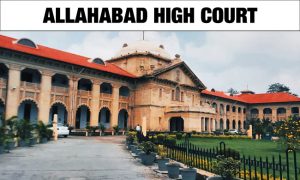 The Hon’ble High Court of Allahabad vide its order dated 15.12.2022 in the matter of BBCL Infrastructure Vs. State of U.P. And 2 Others in Writ Tax No. 1013 of 2022, set aside the orders cancelling the registration of the assessee, finding that the taxing authorities as well as the Appellate Authority should not pass orders in mechanical manner while dealing with the commercial and financial matter, which affect the revenue of the State. It was also found that the officers of the taxing authorities should be more patient and extend every possible help for facilitation of the business and try to overcome the hurdles faced by the traders. Cancellation of the registration should be the last resort. Cancellation of registration not only leads to closure of business but also creates unemployment.
The Hon’ble High Court of Allahabad vide its order dated 15.12.2022 in the matter of BBCL Infrastructure Vs. State of U.P. And 2 Others in Writ Tax No. 1013 of 2022, set aside the orders cancelling the registration of the assessee, finding that the taxing authorities as well as the Appellate Authority should not pass orders in mechanical manner while dealing with the commercial and financial matter, which affect the revenue of the State. It was also found that the officers of the taxing authorities should be more patient and extend every possible help for facilitation of the business and try to overcome the hurdles faced by the traders. Cancellation of the registration should be the last resort. Cancellation of registration not only leads to closure of business but also creates unemployment.
The Petitioner filed the writ petition before the Hon’ble High Court challenging the order dated 30.03.2022 passed by the first appellate authority rejecting the appeal of the petitioner/assessee on the ground of delay as well as the order of cancellation of registration dated 19.09.2019.
Facts: –
- That the petitioner is in the business of bangles and artificial ornaments was initially registered with the taxing authorities under the Central Goods and Services Tax Act, 2017. A Show Cause Notice was issued to the petitioner on 19.09.2019 for cancellation of registration on the ground that the assessee has not filed the return for last six months.
- However, the said show cause notice remained unattended by the petitioner due to which its registration was cancelled by order dated 30.09.2019.
- The Petitioner aggrieved with the said order, filed an appeal before the first appellate authority on 30.03.2022, which was rejected by a computer-generated format order on the same day i.e., 30.03.2022 on the ground of delay in submission of appeal.
It was submitted on the behalf of the petitioner that statutory period as provided under Section 107 of the Act of 2017 is 3 months + 1 month and the order of cancellation is dated 30.09.2019 and due to certain unavoidable condition the appeal was filed at delayed stage. The first appellate authority on the date of filing of appeal has rejected the same on a printed format that the appeal is dismissed on the ground of delay in submission of appeal.
On the other hand, it was submitted on the behalf of the respondents that the petitioner is a partnership firm and if one of the partners was ill and has not filed the return, the other partner should have done the same. It was further contended that there is long delay in filing the appeal.
Held: –
- The Hon’ble Court after considering the submissions made, facts of the case and material on record, found from the perusal of the order dated 30.03.2022, that the appeal has been rejected on the date of its filing by a computer generated order, whereby the reason shown is delay in submission of appeal has not been discussed by the first appellate authority in rejecting the appeal, nor any opportunity was provided to assessee to appear before the appellate authority and put forward his case.
- It was found by the Hon’ble Court that The Act of 2017 was introduced and implemented through-out the country to facilitate the smooth functioning of trade and commerce. It was not punitive in nature. The purpose of the Act was to bring under one umbrella both the goods and services tax which were being charged separately under different heads by the Central and State Government. The idea was that India as a nation was to have single tax regime, and the multiple taxes which were being imposed by different State Government in the movement of goods either interstate or intrastate was to be subsumed in the new tax regime of 2017.
- Further, Both the Central Government and the State Government were trying to stop the evasion of sales/trade tax which was being done at large scale through-out the country. By the implementation of the present tax regime many lacuna have been plugged and the traders/businessman have been brought under single taxation regime. Governments, at both central and state level, have been making effort for last five years to bring under its canopy maximum number of traders/businessmen, so that no sale gets unnoticed by the taxing agencies.
- It was found that cancellation of registration would only lead to more evasion of taxes at the hands of traders and businessman, as they are not going to stop their business but will proceed on some other fake name which will be difficult for the authorities to track. While dealing with the matters of cancellation of registration, the taxing authorities have to be more sensitive and patient. When the taxing authorities are dealing with the small traders/businessman, they should bear in mind that they are not very well educated, and well versed with the technicalities of law and procedure. They have to take help of legal world and sometime it is not possible for them to get best of legal services and there are certain lapses in compliance of formalities at their end.
- The officers of the taxing authorities should be more patient and extend every possible help for facilitation of the business and try to overcome the hurdles faced by the traders. Cancellation of the registration should be the last resort. Cancellation of registration not only leads to closure of business but also creates unemployment. Every trader/businessman directly or indirectly provides some employment, which in turn generates revenue for the State. Cancellation of registration and closure of business would lead to more unemployment, corruption and crime in the society.
- It was found that when a new taxing regime has been enforced, which is only five years old, such drastic step of cancellation of registration should be avoided to the maximum extent, and if a trader or businessman is ready to comply the provisions of the Acts and Rules, the authorities may let of the traders with certain minor penalties such as imposition of fine, without taking drastic measure of cancelling his registration.
- The Appellate Authority being a quasi-judicial authority has more responsibility and acts as Court. Therefore, while dealing with an appeal it should follow the principle of natural justice and before deciding and taking any decision on the appeal at least the assessee or his counsel should be heard.
- It was found by the Hon’ble Court that the taxing authorities as well as the appellate authority should not pass orders in a mechanical manner, when it is dealing with the commercial and financial matter, which affects the revenue of the State. It was thus held that the appellate authority should follow the principle of natural justice by affording opportunity of hearing to the assessee before taking any decision. The appeal should not be dismissed without due consideration of the ground taken in the appeal and the delay condonation application.
- Lastly, it was found by the Hon’ble Court that the order passed by the first appellate authority, which is a cyclostyled order, is unsustainable in the eyes of law and same is hereby set-aside.
The Hon’ble Court with the above findings, set aside the impugned orders and remitted the matter to the first appellate authority to decide the appeal afresh after affording due opportunity of hearing to the petitioner.



